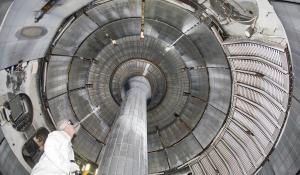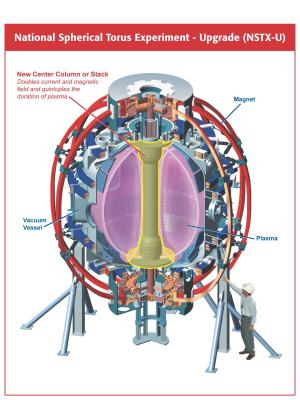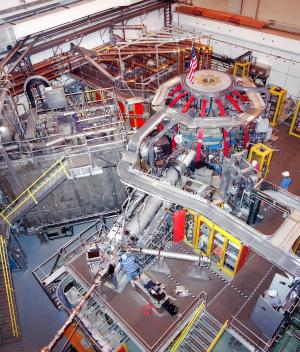NSTX upgrade to enhance fusion physics database
"The US fusion program places increasing emphasis on fusion materials science, and as part of that long-term vision, is presently considering moving toward a fusion nuclear science facility (FNSF)," explains Jonathan Menard, the NSTX program director. "Its objective is to develop the experimental database for all fusion reactor internals and, in parallel with ITER, provide the basis for DEMO." (For more information, see a recent presentation by Dr. Edmund Synakowski, Associate Director, Office of Science, for Fusion Energy Sciences.)
"Both standard aspect ratio and low aspect ratio 'spherical' tokamaks are being considered for an FNSF device, and NSTX in the USA and MAST in the UK are the largest spherical tokamaks in the program worldwide. The spherical tokamak has the potential to provide a smaller and more maintainable FNSF, but many physics and technical issues remain. The recently begun upgrade of NSTX (and upcoming upgrade of MAST) will help address and resolve these remaining issues for spherical tokamaks."
"The NSTX Upgrade (NSTX-U) will also explore high-flux-expansion 'snowflake' divertors,' a novel magnetic divertor named for its shape, as well as liquid lithium as potential divertor power and particle control solutions for FNSF and beyond. All of the above enhanced research capabilities of the NSTX Upgrade also address key research needs for DEMO—independent of aspect ratio. Lastly, the lower collisionality plasmas and overall expanded operating capabilities of the NSTX Upgrade (NSTX-U) facility will enhance support of ITER physics studies and ITPA joint experiments as we approach ITER operation. For example, the new neutral beam injection system and higher field will enable NSTX-U to modify the fast-ion distribution function and the drive for fast-ion instabilities, improving our ability to understand fast-ion confinement for ITER burning plasmas. As another example, NSTX-U will be able to investigate rotation damping and transport changes from 3D magnetic fields at reduced collisionality to support improved understanding of ELM control using 3D fields on ITER."
Click here to read the related story on the PPPL website.




